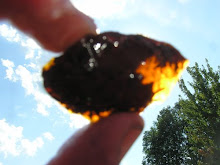
Kennebec River Atlantic salmon, October 1996.
The following (written in op/ed-ese) for the Waterville, Maine Morning Sentinel quickly scopes the salient issues:
---
Breaking the Law is Different from Obeying the Law
By Douglas Watts
Augusta, Maine
Public documents going back 20 years show that hydroelectric dam owners on the Kennebec River have been aware that fish are sucked into their turbines and are killed and maimed. This happens because the intakes of the turbines are open and unscreened, like a window fan with no protective mesh.
 Atlantic salmon are killed at hydroelectric dams by the same mechanism as shown above for American eels.
Atlantic salmon are killed at hydroelectric dams by the same mechanism as shown above for American eels.In June 2009 the few dozen remaining Atlantic salmon in the Kennebec were declared an endangered species under the U.S. Endangered Species Act. It is a federal crime to kill a Kennebec River Atlantic salmon. If you or I did it, we would go to jail.
Kennebec dam owners continue to leave their turbines open and unscreened and allow Atlantic salmon to swim through them, leading to their death.
Because these dam owners have failed to take prompt action to protect the few Atlantic salmon left in the Kennebec, myself and Friends of Merrymeeting Bay and Environment Maine are suing these dam owners in federal court to stop this killing.
Putting in the turbine screens will cost the dam owners a minuscule fraction of their annual profits. Turbine screening has been done now for half a decade at the Benton Falls Dam in Benton and the American Tissue Dam in Gardiner with no effect on their ability to generate electricity.
The Kennebec River is owned by us; not out-of-state dam owners. Using a public river for private gain is a privilege, not a right, and with it comes a responsibility to not interfere with our rights to the river and our right to expect that all laws will be obeyed and endangered species will not be harmed or killed or go extinct. This is why we pass laws.

News item, Kennebec Journal, July 1880.










No comments:
Post a Comment